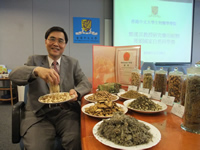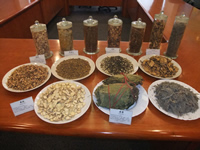|
|
|||||
10 February 2010 This project pertains to the fundamental investigation of plants in the northwestern part of China, such as Ningxia, Xinjiang, Qinghai, Shannxi and Gansu. Most of the plants in this region are believed to be particularly acclimatized to the drought and intense UV irradiation conditions. The project aims at understanding the chemistry and biology of the phytochemicals in the plants grown in the area. Adopting modern scientific methods such as fractionation and isolation of chemical components, spectroscopic characterization, chemical structure elucidation, biochemistry and pharmacology, the project represents a systematic research on the components of certain important plant taxa, such as Asteraceae, Euphorbiaceae, Scrophulariaceae and Lamiaceae. It was found that extreme weather conditions would impact on the composition of plants to produce special compounds useful for the identification of new medicines. It was discovered that plants such as Sinofranchetia chinensis that are resistant to extreme weather conditions (drought, cold, expose to sunlight, etc.) are a rich source of flavonoids. Some possess very potent antioxidative and/or free radical scavenging activities. These compounds can be used to prevent oxidant related illnesses such as gout. These findings have rationalized the traditional use of the plants, and helped to explain their adaptability to abiotic stress from the environment. In addition, it was also found that plants like Artemisia annua, Ajuga lupulina and Artemisia capillaries contain antimicrobials and antifeedants such as triterpenoids that can defend them against attacks from insects and pathogenic microorganisms. Such compounds were also found to be effective in preventing certain cancers, including liver cancer. This indicates that bionics is a useful strategy in the search for new drugs. This research has generated over 200 scientific papers published in international journals, and has been widely quoted by other research papers. It has made significant contribution to the development of botanical resource and natural product chemistry in China, greatly enhancing the scientific contents and international recognition of TCM. Professor Cheng is glad to receive state recognition for the research, ‘This is the result of years of teamwork between CUHK and a couple of leading universities on the mainland. Modern science has come to a stage where it is no longer feasible to conduct research single-handedly. The only way to strive for excellence is to combine the strengths and efforts of various parties. China has made momentous development in science and technology in the past decade and Chinese science will continue to flourish in the years ahead. I hope this award will further promote collaboration between local and mainland institutions.’ He further pointed out, ‘In fact CUHK has a huge advantage in biomedical research as well as in TCM research. We are unique in having a complete array of activities from upstream research to downstream production under one umbrella. We have a good Faculty of Medicine, School of Pharmacy and School of Chinese Medicine, which enjoy leading positions in medical research and education in Asia. Our School of Biomedical Sciences and the Science Faculty are dedicated to basic biological research. Our Institute of Chinese Medicine focuses on TCM research. And our teaching hospital, the Prince of Wales Hospital, is accredited by the State Food and Drug Administration to conduct clinical trials. In addition, the Hong Kong Institute of Biotechnology of CUHK is GMP-accredited to produce TCM products. CUHK will continue to capitalize on our advantages and, in conjunction with our partners on the mainland and overseas, make further developments in this area for Hong Kong.’ Organized by the State Council, the award is the highest honour given by the Central Government in recognition of advancement in basic scientific research. In 2009, 127 research projects were short-listed for the award. After a stringent selection process, a total of 27 research projects were presented the second-class prize, including the ones by Professor Cheng and Prof. Xia Ke-Qing of the Physics Department, CUHK. So far, a total of 12 CUHK professors have received the SNSA. Besides the 2009 winners, two two-time winners are Prof. Xie Zuowei of the Department of Chemistry (second and third-class awards) and Prof. Chan Hsiao-chang of the Department of Physiology (second and fourth-class awards); Prof. Leung Yee of the Department of Geography and Resource Management, Prof. Henry Wong, Prof. Wu Chi and Prof. Jimmy Yu of the Department of Chemistry, and Prof. Dennis Lo of the Department of Chemical Pathology (second-class award); Prof. Thomas Mak of the Department of Chemistry and Prof. Tony Lee of the Department of Information Engineering (third-class award); and Prof. Patrick Wong of the Department of Physiology (fourth-class award).
|
|||||

